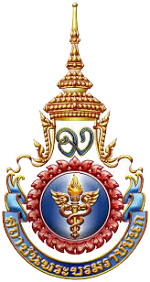ความสัมพันธ์ระหว่างความรอบรู้ด้านโภชนาการกับพฤติกรรมการบริโภคอาหาร ในนักเรียนมัธยมศึกษาตอนต้น
คำสำคัญ:
ความรอบรู้ด้านโภชนาการ, พฤติกรรมการบริโภคอาหาร, นักเรียนมัธยมศึกษาตอนต้นบทคัดย่อ
การวิจัยเชิงสำรวจภาคตัดขวางครั้งนี้มีวัตถุประสงค์เพื่อศึกษา 1) ความรอบรู้ด้านโภชนาการ 2) พฤติกรรมการบริโภคอาหาร และ 3) ความสัมพันธ์ระหว่างความรอบรู้ด้านโภชนาการกับพฤติกรรมการบริโภคอาหารในนักเรียนมัธยมศึกษาตอนต้น อำเภอเมือง จังหวัดนครศรีธรรมราช กลุ่มตัวอย่าง คือ นักเรียนมัธยมศึกษาตอนต้น จำนวน 414 คน เก็บรวบรวมข้อมูลเดือนสิงหาคม พ.ศ. 2567 เครื่องมือในการวิจัยครั้งนี้ คือ 1) แบบสอบถามความรอบรู้ด้านโภชนาการ และ 2) แบบสอบถามพฤติกรรมการบริโภคอาหาร โดยมีค่าความตรงเชิงเนื้อหาเท่ากับ 0.81 และ 0.80 วิเคราะห์ข้อมูลด้วยสถิติเชิงพรรณนา และสหสัมพันธ์ของเพียร์สัน
ผลการวิจัยพบว่า ความรอบรู้ด้านโภชนาการในนักเรียนมัธยมศึกษาตอนต้นมีระดับความรู้ ความเข้าใจด้านโภชนาการ การรู้เท่าทันสื่อด้านโภชนาการ การสื่อสารด้านโภชนาการ การจัดการตนเองด้านโภชนาการอยู่ในระดับไม่ดี ร้อยละ 54.10, 41.30, 41.06 และ 40.33 ตามลำดับ การเข้าถึงข้อมูลด้านโภชนาการอยู่ในระดับปานกลาง ร้อยละ 39.61 การตัดสินใจด้านโภชนาการอยู่ในระดับดี ร้อยละ 50.72 และพฤติกรรมการบริโภคอาหารในนักเรียนมัธยมศึกษาตอนต้นโดยรวมมีคะแนนเฉลี่ยอยู่ในระดับปานกลาง ความรอบรู้ด้านโภชนาการมีความสัมพันธ์ทางบวกกับพฤติกรรมการบริโภคอาหารในนักเรียนมัธยมศึกษาตอนต้นอยู่ในระดับต่ำ (r= 0.31, p < 0.01)
ข้อเสนอแนะ เจ้าหน้าที่สาธารณสุข ครู และผู้ปกครอง ควรมีการจัดกิจกรรมเสริมสร้างความรอบรู้ด้านโภชนาการ โดยเป็นกิจกรรมทั้งในและนอกห้องเรียน รวมถึงการพัฒนาสื่อทางโภชนาการ มีช่องทางการเข้าถึงข้อมูลที่สะดวก และมีการประเมินติดตามภาวะโภชนาการของเด็กนักเรียนชั้นมัธยมศึกษาตอนต้นอย่างสม่ำเสมอ เพื่อส่งเสริมให้นักเรียนชั้นมัธยมศึกษาตอนต้นมีแนวทางในการปฏิบัติ เกิดพฤติกรรมการบริโภคอาหารที่เหมาะสมมากขึ้น
เอกสารอ้างอิง
Bartz A. E. (1999). Basic statistical concepts. (4th Edition). New Jersey: Preentice–Hall.
Best, J, W. (1977). Research in education. 3rd ed. Englewood cliffs. Prentice hall, Inc.
Bureau of Nutrition. (2024). Annual report 2023. Retrieved April 3, 2024 from https://nutrition2.anamai.moph.go.th /web-upload/6x22caac0452648c8dd1f5 34819ba2f16c/m_magazine/33500/4763/ file_download/a9289ba849694ad 6514dd60c223f2c54.pdf. (in Thai)
Chookunhum, P., Sriyasak, A., Boontham, S., Chinglek, W., & Sangartit, S. (2024). Health literacy and obesity health behaviors among primary school students. Journal of Health Research and Innovation, 7(1), https://he02.tci-thaijo.org/index.php/jhri/ article/view/261005/182737.
Ekakul, T. (2007). Research methodology in behavioral sciences and social sciences. Offset Printing Science. (in Thai)
Green, L. W., & Kreuter, M. W. (2005). Health program planning: An educational and ecological approach. Health data center. https://hdcservice.moph. go.th/hdc/reports/page.php? cat_id=46522b5bd1e06d24a5bd81917257a93c.
Health Education Division. (2022). Summary of the results of the assessment of the potential for self-health management of the target group of people fiscal year 2023. Retrieved April 3, 2024 from https://hed.go.th/wp-content/uploads/2024/05. (in Thai)
Kittiboonthawal, P., Chernchum, J., & Cheutong, S. (2022). Health literacy and health behaviors of school-aged children. Journal of MCU Social Development, 7(2), 73-80.
Muksing, W., Tohyusoh, N., & Punriddum, J. (2016). Factors related to health care behavior among school children in Nakhon Si Thammarat nunicipality. The Southern College Network Journal of Nursing and Public Health, 3(3), 66-74.
Nimmagadda, S., Gopalakrishnan, L., Avula, R., Dhar, D., Diamond-Smith, N., Fernald, L., et al. (2019). Effects of an Health intervention for community health workers on maternal and child nutrition and health service delivery in India: protocol for a quasi-experimental mixed-methods evaluation. British Medical Journal, 9(3). https://bmjopen.bmj.com/content/bmjopen/9/3/e025774.full.pdf.
Nithitantiwat, P., & Udomsapaya, W. (2017). Food consumption behavior among thai adolescents, impacts, and solutions. Journal of Phrapokklao Nursing College, 28(1), 122-124.
Nutbeam, D. (2008). The evolving concept of health literacy. Social Science & Medicine, 67, 2072-2078. Piaget, J. (1962). The Stage of the intellectual development of the child’s thinking and reasoning.
Penquin Book. Promsalee, S., & Kanjanasing, S. (2022). The factors related to health literacy of school-aged in health regional 6th. Retrieved May 9, 2024 http://do6.new.hss.moph.go.th:8080/fileupload_doc /2022-02-28-7-22-4473606.pdf. (in Thai)
Punnawit, C., & Thongthep, S. (2020). Health literacy and health behaviors according to national health recommendations among students aged 10–14 year old in Chaloem phra kiat district, Nakhon si thammarat province. Journal of Allied Health Sciences Suan Sunandha Rajabhat University, 5(1), 26-36.
Ruangchai, K., & Uttrachai, A. (2022). Nutrition knowledge, foods consumption and exercise behavior effect to nutritional status in adolescents in phra nakhon si ayutthaya province. Research and Development Health System Journal, 15(1), 101-115.
Ruangying, J., Jorajit, S., & Janyam, K. (2016). Food consumption behavior of adolescents in songkhla province: Synthesis of literacy and factors influencing food consumption behavior. Journal of Liberal Arts, Prince of Songkla University, Hat Yai Campus, 8(1), 245-264.
Samruayruen, K. (2022). Developing a tool for assesing food and nutrutuin literacy among secondary school study. Naresuan university.
Sangkhathiph, A., & Lowirakorn, S. (2017). Food consumption behavior and nutritional status of secondary school students in Kudpladug sub district, Chuenchom district, Mahasarakham province. Journal of Science and Technology, Ubon Ratchathani University, 19(1), 178-189.
Sasitha, R., Ivanovitch, K., & Boonshuyar, C. (2022). Nutrition literacy and eating behavior of undergraduate students of faculty of public health, Thammasat university. The Public Health Journal of Burapha University, 17(1), 28-43.
Singtong, T. (2022). Effects of a nutrition literacy promotion program on eating behavior of secondary school students. Master’s thesis, Thammasat university. TU Digital Collections. https://digital.library.tu.ac.th/tu_dc/frontend/Info/item/dc:178272. (in Thai)
Siripitchtrakul, P., Vatanasomboon, P., Satheannoppakao, W., & Sujirarat, D. (2020). Nutrition literacy among grade 9 students of Bangkok metropolitan administration schools. Thai Journal of Public Health, 50(1), 64-70.
Sripitak, T., Chutipattana, N., & Thongsamsi, I. (2022). Factors related to health literacy associated with consuming behavior and exercise in preventing obesity syndrome of adolescent students in Yala province. The 10th Hatyai adtional and international conference.
Sriyasak, A., Kaewmalai, R., Khruesa-nga, N., Tantiphirom, N., Chaobankoh, P., & Iamsaard B. (2020). Nutrition-label health literacy of school age children: Case study in Phetchaburi province. Academic Journal of Community Public Health, 6(2), 70-82.
Unkaew, N. (2022). Factors influencing food consumption behavior among senior high school students, Khlong Khlung district, Kamphaeng Phet province. Master’s thesis. Naresuan university. (in Thai)
Waratornpaibul, T. (2014). Consumption behavior: Consumerism food and health-conscious food. Panyapiwat Journal, 5(2), 255-264.
World Health Organization. (2021). Global status report PO "MDPIPM BOE) FBMUI 21. Geneva: WHO.
Yamane, T. (1973). Statistics: an introductory analysis. Harper & Row.

ดาวน์โหลด
เผยแพร่แล้ว
รูปแบบการอ้างอิง
ฉบับ
ประเภทบทความ
สัญญาอนุญาต
ลิขสิทธิ์ (c) 2024 วิทยาลัยพยาบาลบรมราชชนนี นครศรีธรรมราช

อนุญาตภายใต้เงื่อนไข Creative Commons Attribution-NonCommercial-NoDerivatives 4.0 International License.
บทความที่ได้รับการตีพิมพ์เป็นลิขสิทธิ์ของ วิทยาลัยพยาบาลบรมราชชนนี นครศรีธรรมราช
ข้อความที่ปรากฏในบทความแต่ละเรื่องในวารสารวิชาการเล่มนี้เป็นความคิดเห็นส่วนตัวของผู้เขียนแต่ละท่านไม่เกี่ยวข้องกับวิทยาลัยพยาบาลบรมราชชนนี นครศรีธรรมราช และบุคคลากรท่านอื่น ๆ ในวิทยาลัยฯ แต่อย่างใด ความรับผิดชอบองค์ประกอบทั้งหมดของบทความแต่ละเรื่องเป็นของผู้เขียนแต่ละท่าน หากมีความผิดพลาดใดๆ ผู้เขียนแต่ละท่านจะรับผิดชอบบทความของตนเองแต่ผู้เดียว





